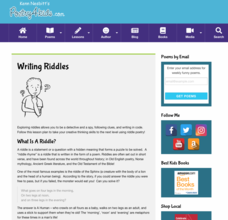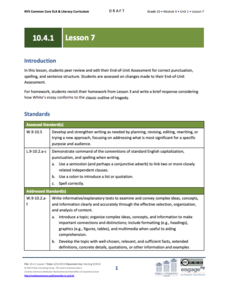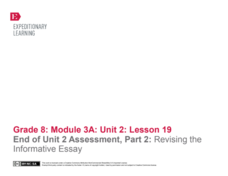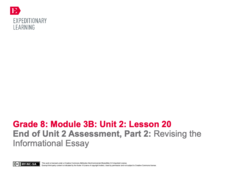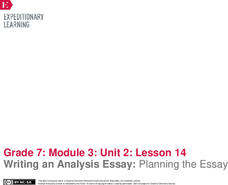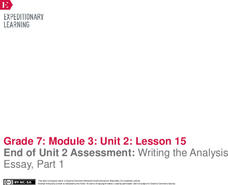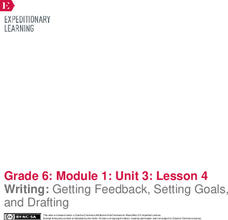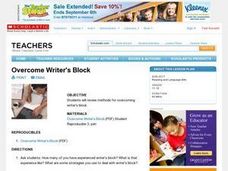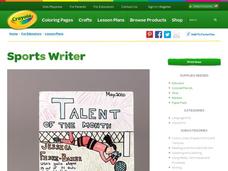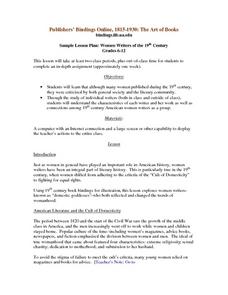Poetry4kids
How to Write a “Favorite Things” List Poem
If your students made a list of their favorite things, would writing poetry be on it? After this poetry writing lesson, it might! Young writers make a list of what they like—or what they don't like—before crafting the list into...
Poetry4kids
How to Write a Cinquain Poem
A lesson challenges scholars to create a cinquain poem. Writers begin by choosing a topic and brainstorm details, then compose their original poem making sure to count syllables.
College Board
2001 AP® English Language and Composition Free-Response Questions
Do pictures really last longer? A prompt from the 2001 AP® English Language and Composition Free-Response Questions asks scholars to analyze the opinion that photography actually limits people when it comes to understanding the world....
College Board
2002 AP® English Language and Composition Free-Response Questions
It is not what you say but how you say it. Scholars use an essay prompt from the 2002 AP® English Language and Composition Free-Response Questions to analyze how an author uses language to describe her past. They also support or argue a...
Poetry4kids
Writing Riddles
What's got 60 eyes, 150 fingers, and an endless number of ideas? Your language arts class! Challenge young writers to come up with clever riddles with an online poetry lesson.
EngageNY
Grade 10 ELA Module 4: Unit 1, Lesson 7
High school writers participate in peer review of their end-of-unit tasks. They begin by discussing their thought process in pairs and then editing their work. Finally, learners participate in a class discussion on the use of the...
Literacy Design Collaborative
Student-Determined Data Analysis
You can't argue with the numbers. Scholars complete activities to prepare for writing a data analysis report. Writers select a research topic and complete a data analysis tool. They share their questions based on the data with peers and...
EngageNY
End of Unit 2 Assessment, Part 2: Revising the Informative Essay
Is that your final answer? Scholars discuss the terms, edit, and revise. They then complete their final drafts as the end-of-unit assessment of Unbroken. Writers use their graded draft essays from a previous instructional activity to...
EngageNY
End of Unit 2 Assessment, Part 2: Revising the Informational Essay
Writers look at the End of Unit 2 Assessment: Best First Draft of an Informational Essay handout and use sticky notes to identify things in their work that need editing and revising. They reference their notes to finalize their...
EngageNY
End of Unit 2 Assessment, Part 1: Drafting the Essay
Young writers use the class time to complete a draft argumentative essay. In answer to the Pygmalion end-of-unit prompt they discuss the change seen in Eliza's inner identity.
EngageNY
Writing an Analysis Essay: Planning the Essay
Writers work on creating a plan for their end-of-unit essay of Narrative of the Life of Frederick Douglass using a Frederick Douglass Essay Planner to help guide their thought process. They then regroup as a class to...
EngageNY
End of Unit 2 Assessment: Writing the Analysis Essay, Part 1
1,2,3,4 score! Writers use the grading rubric to score the model essay. After comparing and discussing their scorings, the individuals begin the end-of-unit assessment.
EngageNY
End of Unit Assessment, Part 1, Continued: Revising Vocabulary and Conventions Based on Feedback
Writers align their position papers with the last two rows in the rubric. After looking at the rubric rows for vocabulary and conventions along with feedback on their papers, class members revise their essays. They then look at the...
EngageNY
Scaffolding for Essay: Planning Body Paragraphs for Position Paper This work is licensed under a Creative Commons Attribution-NonCom
Scholars begin creating a plan for their position papers using a Sustainable Water Management Position Paper Planner. They talk with partners about their claims and counterclaims for the essays. Writers then work independently to...
EngageNY
Writing: Getting Feedback, Setting Goals, and Drafting
Why is it important to set goals as a writer? Scholars process feedback from their mid-unit assessments, writing down their strengths and weaknesses on index cards. Next, pupils use the feedback to begin drafting their hero's journey...
K20 LEARN
Analyzing Literary Figures: Analyzing Literature
The author study gets an update in a research project designed for high schoolers. Scholars search for information about literary figures that connects them to their times, their works, their themes, and other writers. Researchers also...
Curated OER
"The Story of an Hour" Lesson 5: Teacher's Guide and Notes
Learning how to craft a compelling argument supported by evidence and logical reasoning is an essential skill. The fifth instructional activity in "The Story of An Hour" unit asks young scholars to formulate an argument in response to...
K20 LEARN
Introduction to Expository Writing
Move beyond the five-paragraph essay with a lesson introducing young writers to various forms of expository writing. Class members examine description, cause and effect, problem solution, sequence, and comparison forms. They create an...
EngageNY
Grade 12 ELA Module 1: Unit 1, Lesson 24
Today's discussion of The Autobiography of Malcolm X focuses on the precise words, the telling phrases, and the sensory details Haley uses to enliven his story. Writers then work to incorporate these same techniques in the draft of their...
Curated OER
Overcome Writer's Block
Young scholars review methods for overcoming writer's block. They are asked if they have ever experienced writer's block, what the experience feels like, and discuss some strategies that they use to deal with writer's block. They are...
Curated OER
Visualizing While Listening
First graders practice visualization. In this reading and listening comprehension strategy visualization lesson, 1st graders close their eyes and listen to the teacher describe a familiar place, then draw what they visualized in their...
Curated OER
Hooks
Students examine how a hook grabs the readers attention. They read an example of a hook from the book "Charlotte's Web," and discuss the process of writing a hook. Students listen to the story "Hey Al," identify the hooks in the story,...
Curated OER
Sports Writer
Students research the roles of individuals, groups, and institutions in sports history. They create fictional sports magazines to demonstrate an awareness of the uniqueness of individuals and appreciation of themselves as athletes....
Curated OER
Writers of the 19th Century
Students are introduced to women authors during the 19th century. In groups, they read about the criticism they faced during this time period by the public and literary community. Using the internet, they research one author to...
Other popular searches
- Freedom Writers
- Writers Workshop
- Writers Notebook
- Writers Craft
- Freedom Writers Movie
- Writers Craft Story Starters
- Natural History Writers
- Writer's Workshop
- Writers Block
- Freedom Writers Diary
- Women Writers
- Beat Writers






